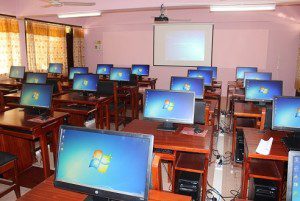The American Tower Corporation (ATC) is to build at least 600 Digital Communities Information Communication Technology (ICT) Learning Centres in seven operational countries in Africa by 2026.
Mr Ashutosh Singh, CEO of ATC Ghana, said so far, they had built 19 in Ghana and there were more to come.
The CEO was speaking at the commissioning of one of the 19 ATC Ghana Centres on the premises of Ghana Girl Guides Association (GGGA) at Achimota in Accra.
The 33-seater Digital Communities ICT Learning
Centre is designed to benefit female pupils and girls within Achimota and its environs, in basic ICT skills, coding, programming, drone technology and other relevant digital skills designed to set them on the path of becoming competitive both in Ghana and on the global scale.
He said the Centres were not just open to children, but to people of all ages, because it had been designed for training in basic ICT skills to help users improve their own careers.
He said the programme was also in line with the government’s vision to digitize all aspects of the Ghanaian economy under its Digital Ghana Agenda.
“We, at ATC Ghana, are proud to play a role in supporting this vision of an inclusive digital economy while encouraging many brilliant young people to go into the (Science, Technology, Engineering and Mathematics (STEM) space,” he said.
He said at ATC Ghana, they believe that supporting digital literacy, especially in communities where they operate as part of their sustainability goals was the right thing to do.
“We, therefore, remain committed to building more Digital Communities centres in the years to come,” he said.
He said as they looked to expand to more areas across the country, they were focused on continuing to engage more partners to help scale up and sustain the Digital Communities programme.
“The success of the DCs initiative will depend on strategic collaboration to provide social-impact programming that accelerates digital equity and impacts lives for the better,” he added.
He said ATC Ghana’s commitment was not in isolation, globally, American Tower Corporation’s sustainability initiatives focus heavily on digital literacy, where we leverage technology to improve access to quality education and the lives of underserved and unserved communities.
The CEO said ATC Ghana’s partnership with the Ghana Girl Guides Association on Digital Communities dated back to the inception of the DC projects.
Mr Marek Busfy, CEO of ATC Africa, said the 4,000 plus ATC towers in Ghana was just a fraction of over 25,000 across Africa, indicating that through these towers, ATC continues to connect people across the continent.
He said the investment into ICT Centres was a recognition that towers were not enough to connect people if there was no access to make full use of the resources the towers offered.
“The particular investment into an ICT centre for girls is also a reflection of ATC’s strong belief and commitment to diversity,” he added.
Madam Viriginia Palmer, US Ambassador to Ghana, said ATC Ghana had been committed to improving mobile and data penetration in the country through strategic investment, and that was commendable.
She noted that records of US investments in Ghana available to the Embassy indicated that ATC Ghana had the biggest US investment in the country.
She noted that ATC Ghana had consistently responded positively to the call to invest and support Ghana’s digital transformation agenda.
“ICT education is critical to national development and social transformation and your continuous investment in that area is helping in a very big way to bridge the digital gap and ensure digital inclusion,” he said.
She said investments into Communities ICT Learning Centres was part of ATC’s sustainability strategy to ensure that a greater majority of people in its operational countries across the world derived full benefit of the infrastructure it provides.
Madam Zakiya Abdul-Wahab, Head of Ghana Girl Guides Association, said the Association has had a five-year relationship with ATC Ghana and that had resulted in an 11-seater ICT Centre at its headquarters.
She said GGGA started several years ago with just 75 members in Ghana, but now it had over 200,000 girls across the country, adding that with STEM becoming a critical development issue, particularly for girls, the provision of such centres was very welcoming for GGGA.
Source: GNA


